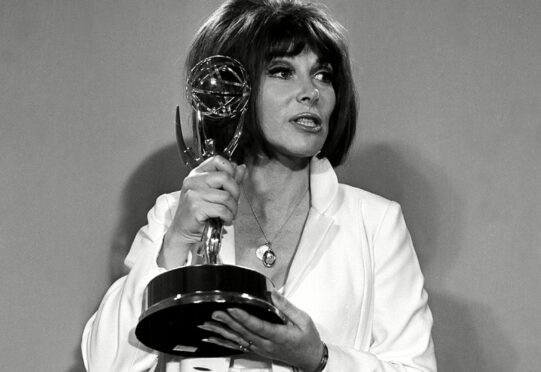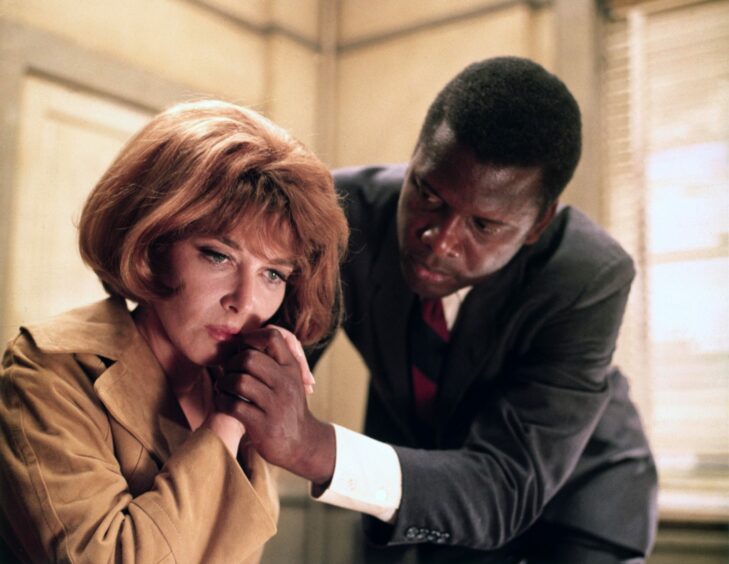
In 1952 Lee Grant was a rising star. An eye-catching role in a Kirk Douglas movie called Detective Story won her the Cannes Film Festival prize for best actress and an Oscar nomination for best supporting actress.
Within the year, however, she was unemployable: a victim of Senator Joe McCarthy’s paranoid, opportunist hunt for the reds hiding under Hollywood’s beds as stars were told to name communists and their fellow travellers in the movie industry or be blacklisted.
Today, at 97, Grant, whose work as a director is to be celebrated with a Glasgow Film Festival retrospective starting on Thursday, remembers the sudden threat was as real as it was savage.
She tells The Sunday Post: “One day you were an actress who could do anything, and the very next day, you could not work in film or television again. I went from top of the heap to being a pariah, and that was a shock that changed me forever.”
In 1947, the House Un-American Activities Committee (HUAC) turned its attention to actors, and her writer husband Arnold Manoff and his friends were among those dragged into the spotlight.
The strain was too much for one close colleague; Joe Bromberg died suddenly of a heart attack and, at his funeral, Grant stated publicly that she believed the stress of being investigated had killed him. The next day she too was on the blacklist.
Later, she was called before HUAC and made an offer: name her husband as a communist and she would be taken off the blacklist. The experience left her so traumatised that, to this day, she struggles with names.
“I can’t even introduce one best friend to another,” she admits. “Part of my brain turns off. If I had to introduce someone on stage, I wrote their name on my hand in ink.”
For daring to refuse to testify against her husband, Grant was banished from film and television for 12 years. “I lost a big part of my acting life,” she says, over Zoom, as she rattles around her New York kitchen making coffee.
“But being blacklisted gave me the fight of my life.”
After her political awakening, Grant refused to be silenced again. She ditched the husband who had treated her more like a housekeeper than a wife and raised her daughter Dinah alone until she fell for producer Joseph Feury. That marriage is still going strong, 50 years on.
Eventually Grant’s ban was lifted in the 1960s. By then, she was a 36-year-old woman in a sexist, ageist industry.
“The only thing I could do was act, and for that I had to look 29,” she says, so she got a facelift and persuaded the mayor of Los Angeles to knock a few years off the date of birth on her driving licence.
“You have to understand how motivated I was,” explains Grant. “I had 12 years to make up for, and nothing was going to stop me. But if the internet had been around back then I would have been finished!”
Some stars never recovered from the blacklist but Grant became one of the few Hollywood stars who went on to become even more successful.
She landed a job on one of America’s top soaps, Peyton Place, and won an Emmy for the role in 1966. The following year, she was hired to star opposite her friend Sidney Poitier in the groundbreaking civil rights drama In The Heat Of The Night, based on John Ball’s novel.
In 1975 Hollywood playboy Warren Beatty wooed her to star in his movie Shampoo. At the time the Bonnie And Clyde actor had a reputation as a serial seducer of stars from Leslie Caron to Joan Collins to Julie Christie, so he decided to send himself up by writing, producing and starring as a Casanova hairdresser.
However, Grant wasn’t one to fall completely under his spell. She felt he overstepped the mark by telling her how to play a scene where she discovers that the Beverly Hills lothario has seduced her character’s daughter – and wasn’t afraid to challenge him.
“When he did that to me, I threatened to quit,” she says, and laughs. “So the next day he said, ‘I’ll never, never, never tell you what to do again’. From there on, it was pretty much a love affair.”
Grant and Beatty went on to become great friends, even sharing a few passionate kisses after filming ended. “I still love Warren,” she reflects. “He’s talented – and, of course, at that time in his life, completely irresistible.”
Their movie proved a huge success and earned Grant an Oscar for best supporting actress yet collecting the award proved a bittersweet moment as she realised part of her life was drawing to a close. “I was 48 or 49 when I did Shampoo,” she said, “and as I was walking up to the stage I had this feeling that it was the end of a romance.
“I wasn’t going to get these wonderful leading parts any more and I was going to join the dust-heap of older actresses. So if I wanted a longer career in the arts, I had to jump from acting to directing.”
She became even more convinced about moving behind the camera after some less-rewarding roles in Hollywood disaster movies like Airport ’77 and The Swarm (1978) — a film she calls “The bees are coming!”
After making the switch she became a trailblazing documentarian, shining a light on social issues. Her experience as a Hollywood outsider strongly influenced her work. In 1981 she made her first documentary, The Willmar 8, travelling to a snowy Minnesota town to report on a strike by eight women employed by the town bank.
They were paid much less than male colleagues and routinely passed over for promotions. In the film, Grant challenged several townspeople and tried to track down officers of the bank for comments but to no avail, while she recorded the toll, economic and personal, on the strikers.
In 1987, she won her second Oscar for the documentary Down And Out In America, in which she criss-crossed the US, visiting small farming businesses who faced foreclosure at the hands of predatory banks.
In Los Angeles, homeless people built a shanty town called Justiceville, later bulldozed by the city. In New York, homeless families were crammed into tiny hotel spaces. As Grant interviewed them, the cracks in their lives and in their relationships brought on by their circumstances were exposed.
In other films she took a sympathetic look at transgender rights and domestic violence and abuse, characterised by a fearlessness fostered by her experiences during the communist witch-hunts.
Grant recalls: “It was a huge opportunity for me finally as a blacklisted person to say the things I wanted to say through documentaries. I could speak with my own voice, rather than acting, which is where you’re saying other people’s words.
“If more directors had come from my background, and got kicked out of the industry for 12 years, maybe they would be more clued up.
“But that’s how a girl who almost failed to graduate from high school became a force for something that really mattered.”
Glasgow Film Festival’s retrospective Looking for America: The Films Of Lee Grant runs March 8-12, CCA, Glasgow. glasgowfilm.org
ON HER MOVIES
In The Heat Of The Night, 1967
When Grant returned to Hollywood movies, first in line was her friend Sidney Poitier, who had her play the pivotal role of the grieving widow in the groundbreaking In the Heat Of The Night. Poitier had also been blacklisted by the HUAC for some years. Grant said: “This film was the first time we worked together as actors, but we always trusted each other, so the scene where Sidney has to tell me that my husband is dead was mostly improvised.”
Shampoo, 1975
“Warren Beatty showed up when I was doing a Neil Simon play and said, ‘I have a script for you.’ That script turned out to be Shampoo,” Grant recalled. “Goldie Hawn was in Shampoo and so was Julie Christie. He had romances with both. Here’s the kind of power Warren had. I had a New Year’s party with about 100 people in my apartment, and when Warren came into the living room, 50 pairs of knees buckled. It was like he was a hypnotist. He had total power.”
The Swarm, 1978
“This was the worst movie ever made and if I hadn’t needed the money, they would never have gotten me to do it,” said Grant. “Michael Caine was in it, so were Gregory Peck and Fred MacMurray – all actors who needed money so badly they made this movie about killer bees. My big line was, ‘The bees are coming!’ I think we did 12 takes before I could say it without laughing, much to the fury and frustration of the director, who also wrote it. Then we all got paid and went on to do better things!”

Enjoy the convenience of having The Sunday Post delivered as a digital ePaper straight to your smartphone, tablet or computer.
Subscribe for only £5.49 a month and enjoy all the benefits of the printed paper as a digital replica.
Subscribe © AP/Shutterstock
© AP/Shutterstock © Mirisch/United Artists/Kobal/Shu
© Mirisch/United Artists/Kobal/Shu